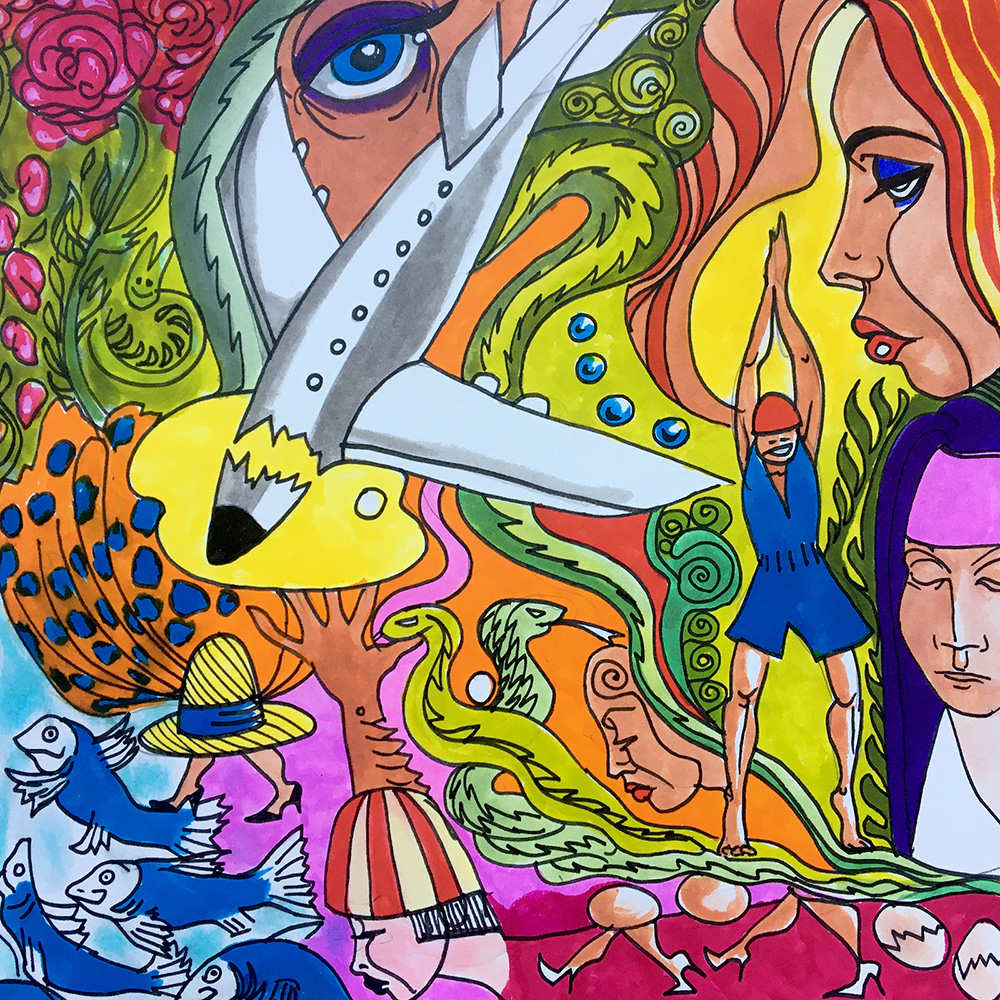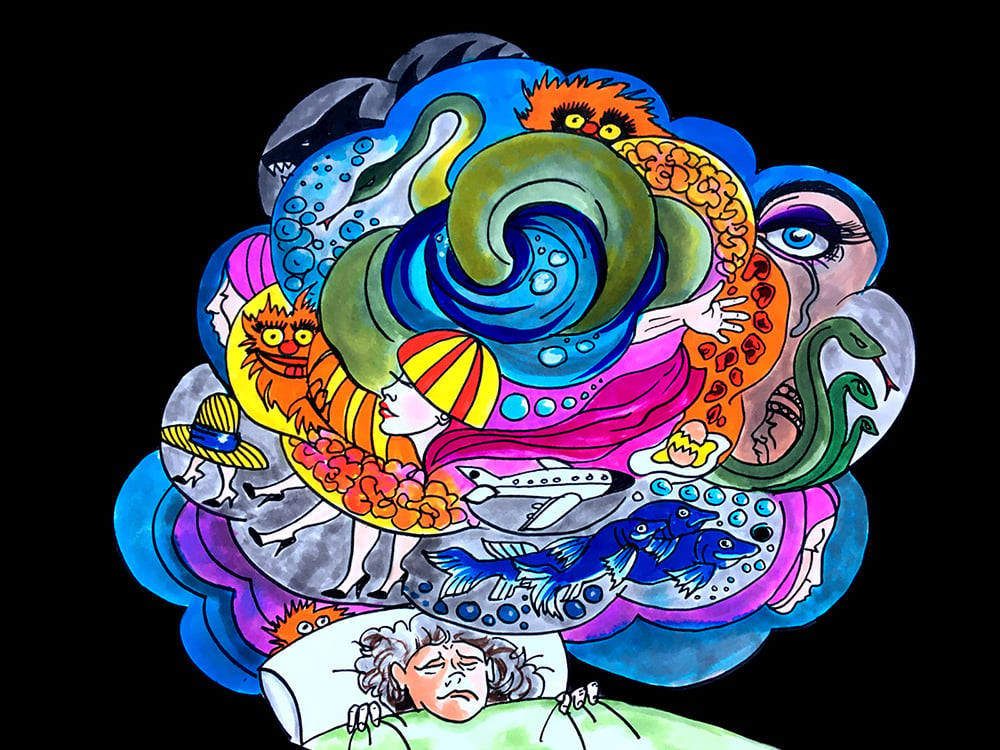If you’re like me, you’re probably waking up in the darkest part of the night, say around 2:30 a.m., and staring into the blackness, wondering what the hell is going to happen next.
When insomnia strikes, I do everything that you’re not supposed to do. I stare at my phone. I “doomscroll” through Twitter. I revisit every bad decision and mortal embarrassment I ever suffered. I wonder about each ache and bodily twitch and think, “Is it COVID, cancer, lupus? Is it finally lupus?”
Around 4:30 a.m. I fall back into a sleep so rife with insane dreams it’s like the inside of my head is an exploding paint factory. The resulting melty mixture — colours, shapes, random sets of googly eyes — resembles a surrealist horror movie. Add booking airline tickets to this conflagration, because for some reason travel arrangements are a recurring theme.
From there I move to sludgy mornings drowned in coffee and a feeling of being slightly underwater all day, until evening rolls round and the whole circus begins again.
People’s sleep patterns are all over the place right now. COVID-19 may be taking up the largest share of mental energies, but there’s lots of other stuff to freak out about. Economic meltdown, glacier meltdown, the U.S. election, the apparent existence of aliens. And then there are the questions. Did I make an ass of myself during the Zoom meeting today? Where is my relationship going? Should I take up yoga? The endless chatter of a brain unmoored in the deepest darkest night.
Leva Sleep, a company that manufactures beds, just released the results of a recent survey taken by 1,000 Canadians. Although we’re spending more time in bed, we’re not having such a good time there.
“Nearly half of Canadians (47.2 per cent) report spending more time in bed since the COVID crisis started,” it reports. “Women report spending more time in bed (54.4 per cent) than men (45.6 per cent).... Only 4.7 per cent of Canadians said that they are “entertaining” in bed versus 36.6 per cent who are sleeping. Only 11.7 per cent are watching TV, being on social media (8.4 per cent), not sleeping (5.3 per cent), or eating (2.8 per cent).”
Being a bed company, the Leva solution is to buy a new bed.
There’s an arsenal of things to fight off sleeplessness — big fluffy pillows, white noise machines, fans, weighted blankets. Some people swear by deep breathing exercises or meditation. There are also drugs that promise a good night’s sleep. In the first few months of the pandemic, during the panicky moments of hardcore lockdown, sales of antidepressant, anti-anxiety and sleeping medications soared.
The correlation between stress and sleeplessness is self-evident, but the abrupt end of daily life due to the pandemic played a role. The ordinary patterns of getting up, getting dressed and going to work were suddenly gone. Some people slept more while others slept less. Naturally for me, my brain did its best to cope by delivering up nightly visions that would make David Lynch flinch. Thanks, brain!
My own sleep habits have waxed and waned over the past six months (has it really been that long?), but I pretty much always wake up throughout the night. Sleep fragmentation is the clinical term for it. It’s also a handy descriptor for what happens at around 3 p.m. the following day, when I can’t keep my eyes open and begin to fall to pieces.
Waking more frequently during the night is also why people tend to remember their dreams.
When the pandemic first emerged, sleep professionals suggested this explosion of dreaming might have been due to the fact that so little was happening on a day-to-day basis that people’s brains were making up for the loss of outside stimulus with an explosion of lurid, kooky dreams.
I don’t know about this hypothesis, since most people are taking in unprecedented amounts of information and daily dramas. Think of all the stuff that’s happened since the middle of March.
There are plenty of logical explanations for the changes to people’s sleeping habits, but I’m interested in the illogical ones. Specifically, the fact that the scientific and research community still aren’t exactly certain why your head opens up at night like an observatory and the universe pours in.

To put it more simply, dreams are some weird shit.
A case in point.
People who have absolutely no relationship to one another can sometimes share dreams. I stumbled across this phenomena while scrolling through Twitter, where I found a series of stories from people who had met people in their dreams and agreed collectively on a password, so that if they were ever to meet in waking life, they would be able to recognize each other. That’s exactly what happened to a pair of women who met in a dream and then again in the real world.
Needless to say, the story freaked me out, and now at 3 a.m. I think about it.
Even the professionals seem to simply throw their collective hands in the air and admit that it’s just weird, Psychology Today reports.
“In short, we have no good explanations for shared dreams. Perhaps that is why science has not yet investigated these events. Science has no place to put them within its current worldview — but this is all the more reason to investigate them. Paradigm-challenging phenomena are the most important data for science because they force revolutionary changes.”
The briefest perusal of forums dedicated to dreams reveals some seriously spooky stuff. From dream sharing it’s a quick trip to the idea that dreams exist on a different temporal plane than regular activities, meaning they can move backwards and forwards in time. Hence, precognitive dreams that pop up and show you a glimpse or two, seemingly from the future.
The other thing that I’ve noticed in the last few months is the experience of déjà vu. In fact, these experiences have exponentially increased. It’s not always a pleasant thing; I’m always afraid that it harbours some ill portent, ominous omens from the future.
As your poor, beleaguered brain staggers along, taking in massive amounts of information — news conferences, press releases, Twitter storms, actual storms, aliens — it’s natural that the period when you’re supposed to make sense of it all would also be deeply affected. The idea that individual dreaming minds can meet up with each other is the least of the surprises that the world currently offers.
In fact, if ever there was a moment to connect to the astral plane, it’s probably now, when the global pandemic has shrunk the world and undone the boundaries between dreaming and waking life.
But before we head off into deep Jungian territory, let’s return to reality. Insomnia is awful. Not only does it mess with your ability to focus, but it strikes when you are at your lowest ebb — alone, in the dark, prey to the many terrible things currently afoot and unable to fight off feelings of overwhelming dread with the distractions you use in the daylight hours.
The benefits of sleep are well-documented. Conversely, the impact of not sleeping is dire. Essentially, it will eventually kill you after making you feel like crap. The usual advice is the same: don’t drink coffee, try to get some exercise, avoid reading the news, yadda, yadda, yadda. But if all those things fail and your sleep continues to resemble an HBO drama on acid, can you use this experience constructively?
Can you make your insomnia work for you?
The quick answer is maybe. I haven’t managed to read any Russian novels or solve mathematical theorems, but I have managed to control my dreams a bit better. And even sometimes to enjoy the messages that they convey.
If dreams are, in fact, a system for sorting through the confusion that is the current day, their colourful chaos is a useful reminder that the universe is a wild and woolly place. You can sleep on that. ![]()
Read more: Health
















Tyee Commenting Guidelines
Comments that violate guidelines risk being deleted, and violations may result in a temporary or permanent user ban. Maintain the spirit of good conversation to stay in the discussion.
*Please note The Tyee is not a forum for spreading misinformation about COVID-19, denying its existence or minimizing its risk to public health.
Do:
Do not: